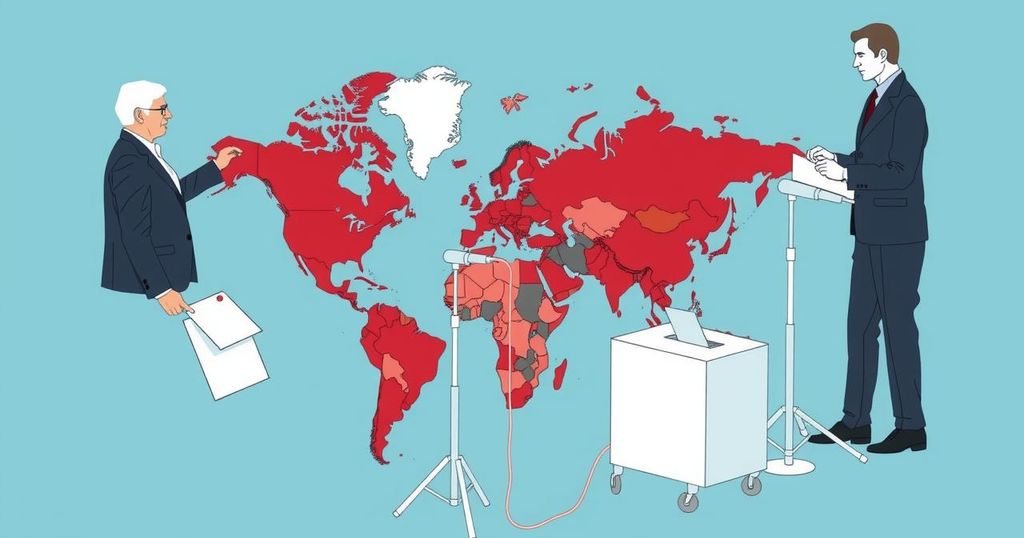World news
AFRICA, AFRICAN NATIONAL CONGRESS, ASSOCIATED PRESS, BRITAIN, CAS MUDDE, DEMOCRACY, EMILIO MORENATTI, EUROPE, FAR RIGHT, FOREIGN POLICY, GHANA, HUMAN RIGHTS, KWAZULU - NATAL, LONDON, MK PARTY, NAMIBIA, NELSON MANDELA, POLITICS, POPULISM, ROB FORD, UNITED KINGDOM
Marisol Gonzalez
0 Comments
Global Elections 2024: A Turbulent Year for Incumbent Governments and Democracy
In 2024, global elections saw widespread voter dissatisfaction, leading to significant defeats for incumbent governments in nearly 70 countries. From India to South Africa, economic instability and social unrest prompted voters to express discontent, often turning to opposition or outsider candidates. This trend highlights a challenging year for democracy as many nations navigated political turbulence, allegations of interference, and growing far-right influence.
In 2024, global voters delivered a resounding message of dissatisfaction with their incumbents, as around 70 nations, representing half of the world’s population, held elections. The results were marked by a notable trend of ousting established governments across continents, from India to South Africa. Growing economic instability, driven by inflation and fallout from international conflicts, fueled public discontent, leading to significant electoral changes.
Noteworthy shifts occurred in several nations. In South Africa, the African National Congress, which had governed since apartheid, faced a drastic decline in support, forcing it into a coalition with opposition parties. This decline echoed in countries like Senegal and Botswana, where long-standing regimes faced electoral defeats. India experienced a significant upset, with Prime Minister Narendra Modi’s party losing its parliamentary majority after a decade in power, necessitating coalition governance.
The political landscape in Japan also shifted dramatically, as Prime Minister Shigeru Ishiba’s party suffered major losses due to public dissatisfaction with financial scandals within the government. In contrast, the United Kingdom saw the Conservative Party ousted after 14 years, marking a shift in voter sentiment and a trend towards smaller parties.
Internationally, the rise of far-right populism was evident, particularly in the European Union, where conservative parties challenged traditional ruling entities in multiple countries. Allegations of election interference, particularly from foreign entities, raised concerns over electoral integrity in nations like Romania, where major disruptions occurred just before anticipated elections.
As the year concluded, the unpredictability of global politics was epitomized by Donald Trump’s return to office in the United States, generating anxiety among allies and adversaries alike. With several notable political crises unfolding worldwide, including severe unrest in Mozambique and turbulence in South Korea, observers anticipate further challenges to democratic processes as countries brace for upcoming elections in 2025.
The year 2024 marked a significant period of political upheaval globally, with a wave of elections reflecting widespread voter discontent toward incumbents. This discontent can largely be attributed to the prolonged effects of the COVID-19 pandemic and ongoing economic instability driven by geopolitical tensions, particularly the conflicts arising from Russia’s actions in Ukraine. The resulting inflation and dissatisfaction have fostered an environment where many voters are willing to challenge established political parties, often in favor of more radical alternatives. This trend illustrates a growing global sentiment that, while supportive of democratic ideals, expresses frustration over the execution of democratic processes as they currently stand.
In summary, the year 2024 served as a pivotal moment in global politics, characterized by a significant pushback against incumbent governments amidst rising economic and social tensions. The elections across numerous countries revealed a yearning for change and a rejection of the status quo, prompting many governments to reconsider their approaches to governance. As voters increasingly seek representatives who resonate with their needs, this shift foreshadows an intriguing landscape for future elections as democratic ideals are tested amid growing populism and instability.
Original Source: www.clickondetroit.com




Post Comment